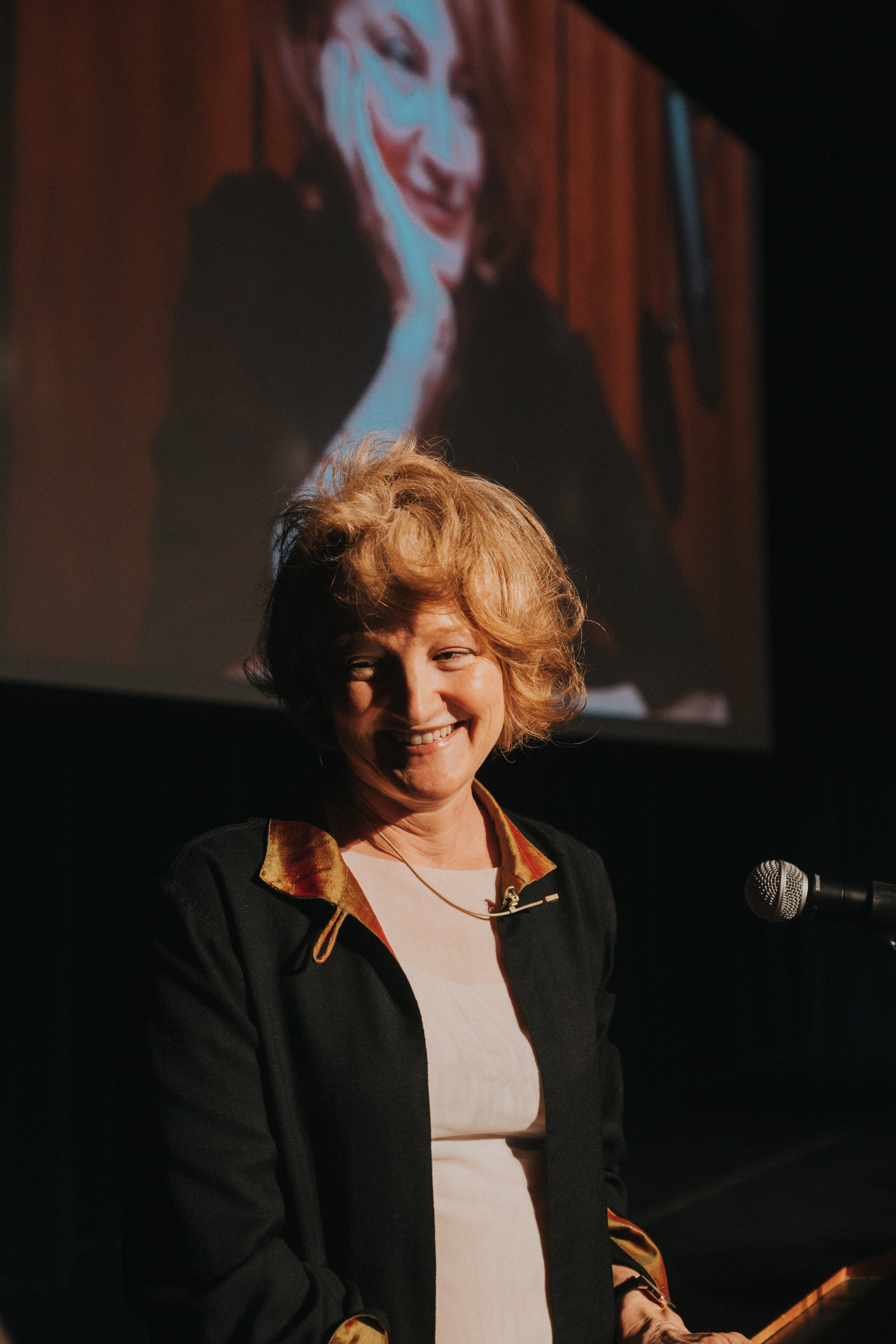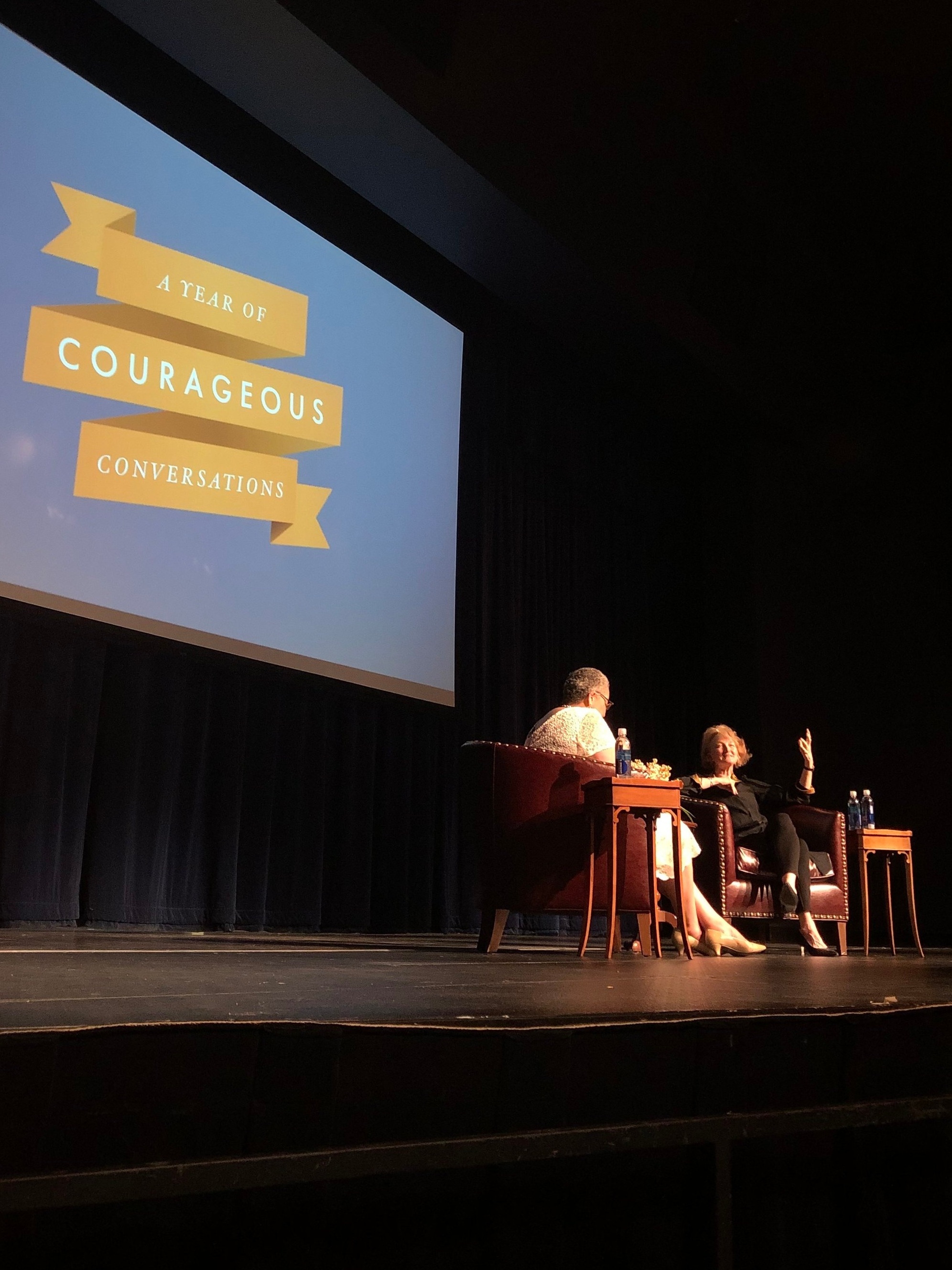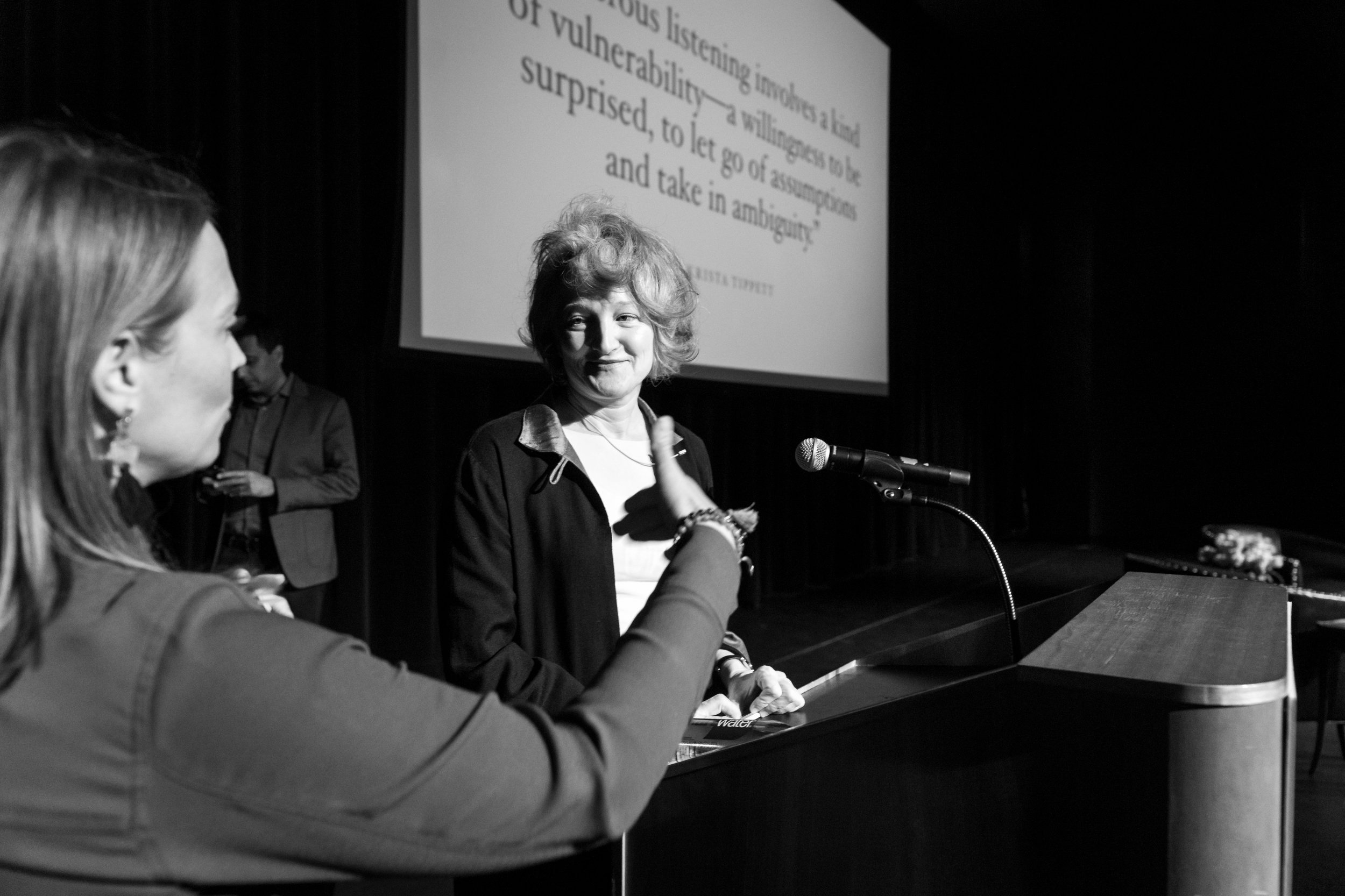by RENEE BLUE
May 23rd marked the launch of A Year of Courageous Conversations in Barrington, Illinois — and what a luminous beginning it was.
Jessica Green and the Reverend Dr. Zina Jacque, co-curators of the new year-long series with Claire Nelson and Lauren Hood of Urban Consulate, welcomed Krista Tippett to Barrington High School to share her talk, “The Adventure of Civility.”
Krista Tippett is a Peabody Award-winning broadcaster, a New York Times bestselling author and a National Humanities Medalist. She is also the esteemed host of the program On Being, which explores “the animating questions at the center of life: What does it mean to be human? How do we want to live? And who will we be to each other?”
Tippett is at home in deep conversation, reflecting on these questions.
To a crowd drawn from Barrington and beyond, Tippett proffered the message that we all hold within us the ability to do the work—both civic and spiritual—to diminish the distance that disagreement places between us.
In this era of political polarity, it can be all too easy to retreat to opposite corners, to seek comfort in camps of the like-minded. We have developed entire vocabularies of derision and defamation, language that distances and otherizes.
To counter this animosity, Tippett guides us toward Frances Kissling’s “crack in the middle where there’s some people on both sides who absolutely refuse to see each other as evil.” It’s there, she says, that we will find we are able to engage in the sort of civil exchange that helps us understand one another a bit better. When we create these spaces for taking up the hard questions, Tippett says we become “nourishers of discernment, fermenters of healing.”
So how does one begin? Besides the traditional olive branch, Tippett offers a few “encouragements” — some reminders and values to inform our journey toward mutual understanding and reconciliation.
1. Words Matter
This may seem a bit obvious, especially coming from a journalist, author and professional conversationalist. Still, Tippett says it’s worth remembering that the words we use shape how we understand ourselves, and how we interpret the world.
“And the world right now needs the most vivid, transformative universe of words that you and I can draw on and give voice to,” she said.
In reflecting on the ways in which language liberates and hinders us, Tippett notes that one word, in particular, has proven itself unhelpful and limiting in its scope: tolerance.
“It connotes allowing, enduring, indulging,” she says. “Tolerance hasn’t taught us or asked us to engage, much less to care about, the stranger; tolerance doesn’t even invite us to understand, to be curious, to be open to be moved or surprised by the other.”
In place of restrictive language, Tippett says we need, in the words of poet Elizabeth Alexander, “words that shimmer.” She says that we have “hit the limits of our collective belief in facts to tell us the whole story—or even to tell us the truth.”
Tippett encourages us to look to poetry to “give voice to what is deepest and truest.”
2. Rediscover Questions as Civic Tools and Listening as a Social Act
Tippett acknowledges that a simple, honest question can sometimes get to the heart of the matter. She cautions, though, that simplistic questions are often met with simplistic answers.
Instead, Tippett exhorts us to ask generous questions, which she defines as those that invite honesty, dignity and revelation.
While questions often beg quick answers, Tippett encourages patience. She quotes the poet Ranier Maria Rilke, who, in a 1903 letter to his protégé, poet Franz Xaver Kappus, wrote of loving questions themselves, and living patiently into them until one distant day arriving at the answer.
Sitting with that uncertainty can be instructive, in and of itself.
Too often, we ask questions but are not ready or willing to listen to the answer. Listening, Tippett notes, is not about being quiet while the other person speaks until you can say what you want to say. “Listening is not primarily about being quiet; it is about being present.”
Listening is, unto itself, an act of generosity.
3. Think of Virtues as Social Technologies
Tippett extols virtues as tools for the art of living. This is an evolution from her childhood concept of “virtue,” when, steeped in the language of her Baptist upbringing in small-town Oklahoma, she saw it as a sort of “moral insurance policy.”
Now, she says virtues are “spiritual and social technologies… a way to attend to conduct as much as to content.”
Tippett’s closely held virtues—humility, curiosity, hospitality and love—provide a way of grounding ourselves and, if we have not yet mastered them, of practicing what we hope to become.
She speaks of the virtue of humility as “a leavening agent.” In its simplest sense, she says, it’s not about making yourself small, but about making others big.
Humility’s companion, according to Tippett, is curiosity. Are we truly ready and willing to be surprised by the other? If not, she says, it’s best to go away and work on ourselves first.
Conversation is, at its best, an invitation of sorts. To offer that invitation sincerely is to do so with hospitality. Tippett notes that offering hospitality is not the same as celebrating what feels oppositional or uncomfortable.
What it does do is “create a trustworthy space, in which the ground for something new can be laid.” Conversation, in and of itself, does not make the participants any more alike, but it does “fundamentally alter what is possible ahead between us.”
When we have the opportunity to converse, Tippett pleads for us to do so with the virtue most often spoken of, but so rarely practiced: love.
Love, she says, is “the only thing big enough to create the common life that our world needs and that our century demands.” Not a romantic notion of love, but the expansive love that embodies our most generous selves, and abides despite challenge or lack of reciprocation.
In closing, Tippett encouraged us to do our part in “making this generative story of our time.” Entering these conversations is important—maybe the most important work we can do.
“Across my life of conversation I have seen a strange, deep truth of life that wisdom emerges precisely through those moments when we have to hold seemingly opposing realities in a creative tension and interplay.” Her hope is that we will take a deep breath, open our hearts and engage.
As part of The Civil Conversations Project she founded in 2011, the On Being producers created a Better Conversations Guide and outlined their Grounding Virtues. Together, they form a roadmap of sorts for locating the “crack in the middle” and forging ahead in hopes of establishing better understanding. It’s a wonderful place to begin.
ABOUT THE SERIES
Krista Tippett’s talk was the launch of a new series, A Year of Courageous Conversations, starting September 2019 through June 2020 at Barrington’s White House. This series is made possible thanks to generous support from Jessica & Dominic Green, Kim Duchossois, Sue & Rich Padula, Barrington Area Community Foundation and BMO Wealth Management.
This series is presented by Urban Consulate in partnership with Barrington’s White House, BStrong Together and Barrington Area Library. With special thanks to co-curators Dr. Zina Jacque, Jessica Swoyer Green, Claire Nelson, Lauren Hood and advisors Village President Karen Darch, Kim Duchossois, David Nelson, Sue Padula, Beth Raseman, Rollin Potter, Conor Libit, Jeanne Hanson, Kyle Thomas Kick, Sam Adams-Lanham, Casey Handal and Amy Wickstrom.
To read more, visit CourageousConversations.us












